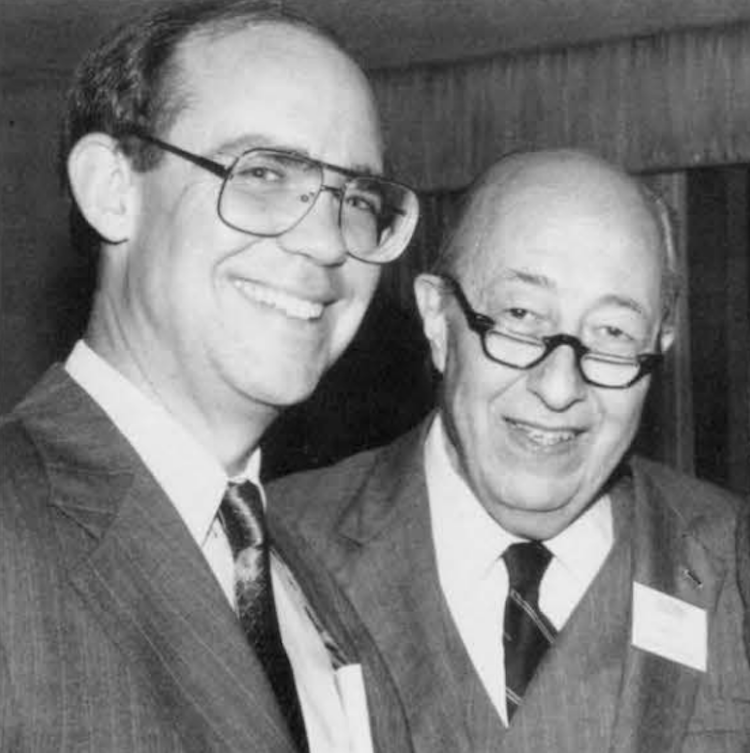From Waterloo to Washington: The Legacy of R. Gordon Hoxie

Photo: R. Gordon Hoxie (right) with D. David Eisenhower (left) in 1990. Courtesy of Special Collections & University Archives, Rod Library, University of Northern Iowa.
From Waterloo to Washington: The Legacy of R. Gordon Hoxie
When R. Gordon Hoxie left Waterloo, Iowa, to attend Iowa State Teachers College in the late 1930s, he carried with him a small-town sense of purpose and a big curiosity about how ideas shape history. Those values would guide him through a lifetime of teaching, leadership and public service that reached from the classrooms of Cedar Falls to the corridors of power in Washington, D.C.
Hoxie graduated in 1940, just as the world was on the brink of war. Like many of his generation, he answered the call to serve. During World War II, he flew with the U.S. Army Air Forces and rose to the rank of captain. He later continued his service in the reserves, where he attained the rank of brigadier general. The discipline and sense of duty he gained during those years became hallmarks of his leadership style.
After the war, Hoxie returned to academia, earning advanced degrees from the University of Virginia and Columbia University. At Columbia, he worked closely with Dwight D. Eisenhower, who was then serving as the university’s president. That experience deepened Hoxie’s interest in the American presidency — an interest that would later define his career.
Hoxie went on to teach history at the University of Denver before joining Long Island University, where he became dean of liberal arts and sciences and later chancellor. His time there was marked by a commitment to academic rigor and open dialogue, even as the campus navigated the turbulence of the 1960s. Though his tenure ended amid student protests and administrative clashes, the experience reaffirmed his belief that education must remain a space for debate, dissent and civic engagement.
In 1965, drawing on his connections with Eisenhower and other national leaders, Hoxie founded what became the Center for the Study of the Presidency, now the Center for the Study of the Presidency and Congress, in New York City. His goal was to promote scholarship and public understanding of presidential leadership and the constitutional balance of power. The center’s work, including its flagship journal Presidential Studies Quarterly, continues to shape research and public discourse today.
Throughout his career, Hoxie remained deeply connected to his alma mater. He established a fund shared by the Departments of History and Political Science to promote the study of the presidency. This fund has allowed UNI to bring many speakers to campus to discuss democracy and governance. His gift reflects his lifelong conviction that universities have a responsibility not only to educate but also to engage citizens in the work of democracy.
That legacy continued this fall with the Hoxie Forum: Congress, the President and the Balance of Power on Monday, Oct. 13. The event brings former members of Congress to UNI for open discussions with students and community members about how government works, and how it sometimes doesn’t.
Over the course of his life, Hoxie was honored with numerous awards, including the Legion of Merit and the Distinguished Service Medal of the City of New York. He also served as a consultant to the U.S. State Department and maintained active relationships with universities abroad, including in South Korea and Poland. Yet despite his global outlook, he never forgot his Iowa roots.
Hoxie often credited another Iowan, historian Carl Becker, as a guiding influence. Becker’s belief that democracy depends on “thinking citizens” resonated deeply with Hoxie’s own mission. It was a philosophy he carried from the classrooms of the Iowa State Teachers College to his founding of a national institution dedicated to studying the presidency.
R. Gordon Hoxie passed away in 2002, but his legacy continues — in UNI’s lecture halls, in the students who gather each year to debate the balance of power, and in the belief that knowledge, conversation and civic duty remain at the heart of a healthy democracy.
